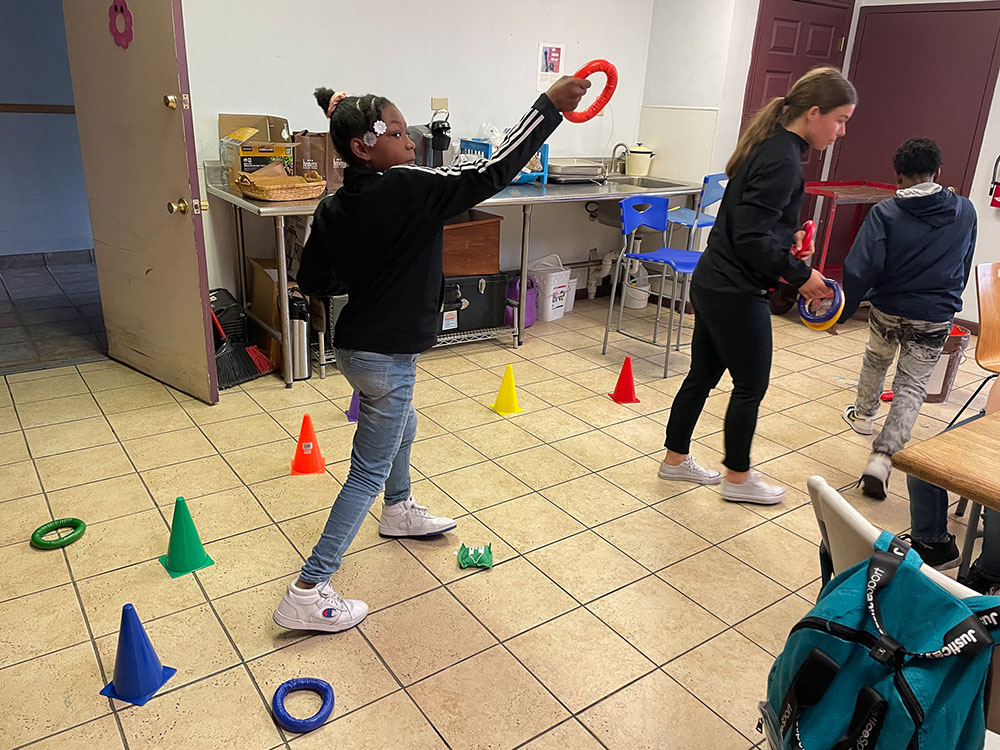Our Programs
Early Childhood
Early childhood nutrition leads to healthy development
Preschool-aged children from ages 0 to 5 experience rapid stages of development that require consistent, nutritious food in order to grow physically, emotionally and cognitively properly so they can enter school ready to learn.
Through the USDA Child and Adult Care Food Program (CACFP), Children’s Hunger Alliance assists In-Home Childcare providers, Child and Head Start Centers serve more nutritious food, and create healthier child care environments. As one of the largest sponsors of CACFP programs in the state of Ohio, Children’s Hunger Alliance currently helps more than 500 In-Home Childcare providers and 65 Childcare and Head Start Centers receive reimbursements for healthy meals and snacks provided to children in their care.
In addition, Children’s Hunger Alliance offers free training for child care providers based on the Ohio Healthy Programs so they can encourage healthy eating and active living among the children in their care.

School Breakfast
Start mornings right
Eating a healthy breakfast is proven to help academic performance and overall concentration in students. No child can learn on an empty stomach. Studies show that students are also less likely to be tardy or absent, and visits to the nurse decline when a healthy breakfast is offered at school. Overall student health improves with consistent access to healthy school meals which help fill nutritional gaps experienced by children at-risk for food insecurity.
Only 54% of children who qualify for free-or reduced school meals are participating in school breakfast. Children’s Hunger Alliance works with local school districts to increase breakfast participation and remove the barriers so more children start their day with a healthy meal. CHA provides hands-on guidance for practical ways to offer breakfast given each school building’s unique environment. Consultations with school districts includes sharing best practices and resources in order to increase breakfast participation.

Afterschool Meals

Curb hunger
While many food insecure children receive free or reduced-priced meals at school, they often go without healthy meals when school is out. Afterschool programs are one of the most effective strategies for reaching children with nutritious food, as meals are delivered to sites where children already congregate. These programs are vital to bridge the meal gap so many children face each year.
Through the USDA’s Child and Adult Care Food Program (CACFP), Children’s Hunger Alliance provides healthy meals to afterschool programs across the state. We are a one-stop, free resource dedicated to easing the burden for organizations that want to provide healthy food for the children they serve.
Summer Meals

Hunger doesn't
take a break
Many Ohio families cannot provide consistent access to healthy food for their children, particularly during summer break. Only 1 in 10 children who receive free or reduced-price meals during the school year have access to a summer meal program. Summer break increases food insecurity and can lead to learning loss in low-income children. Children are at greater risk of hunger and are more likely to experience weight gain during the summer due to loss of balanced meals and poor nutrition. Summer nutrition programs serve as a critical resource to fill the meal gap that so many children face each year.
Through the USDA’s Summer Food Service Program (SFSP), Children’s Hunger Alliance provides healthy meals to summer programs across the state. We are a one-stop, free resource dedicated to easing the burden for organizations that want to provide healthy food for the children they serve.
Weekend Meals

Fill the gap
While many children who are at-risk of food insecurity receive free or reduced-priced meals at school, they often go without meals on weekends. CHA's weekend meals help fill the gap for many children.
Weekend meal boxes include pre-packaged breakfast and lunch/dinner meals.
Nutrition education
Healthy Learning
Children’s Hunger Alliance educates and engages children and their caretakers in healthy food choices and physical activity.
Our Nutrition Education and Physical Activity team helps In-Home Childcare providers and Childcare Centers learn how to plan meals and offer healthy food options to the children in their care.
Children’s Hunger Alliance also instructs providers and centers in Ohio Healthy Programs (OHP). We teach curriculums to staff about healthy food choices and physical activity.
At Childcare Centers, Afterschool and Summer Nutrition Programs, we offer programming to teach children about making healthy food choices and engage them in physical activity.

We are committed to
non-discrimination
Non-Discrimination Policy
In accordance with federal civil rights law and U.S. Department of Agriculture (USDA) civil rights regulations and policies, this institution is prohibited from discriminating on the basis of race, color, national origin, sex (including gender identity and sexual orientation), disability, age, or reprisal or retaliation for prior civil rights activity.
Program information may be made available in languages other than English. Persons with disabilities who require alternative means of communication to obtain program information (e.g., Braille, large print, audiotape, American Sign Language), should contact the responsible state or local agency that administers the program or USDA’s TARGET Center at (202) 720-2600 (voice and TTY) or contact USDA through the Federal Relay Service at (800) 877-8339.
To file a program discrimination complaint, a Complainant should complete a Form AD-3027, USDA Program Discrimination Complaint Form which can be obtained online at: https://www.usda.gov/sites/default/files/documents/USDA-OASCR%20P-Complaint-Form-0508-0002-508-11-28-17Fax2Mail.pdf, from any USDA office, by calling (866) 632-9992, or by writing a letter addressed to USDA. The letter must contain the complainant’s name, address, telephone number, and a written description of the alleged discriminatory action in sufficient detail to inform the Assistant Secretary for Civil Rights (ASCR) about the nature and date of an alleged civil rights violation. The completed AD-3027 form or letter must be submitted to USDA by:
- mail:
U.S. Department of Agriculture
Office of the Assistant Secretary for Civil Rights
1400 Independence Avenue, SW
Washington, D.C. 20250-9410; or - fax:
(833) 256-1665 or (202) 690-7442; or - email:
Program.Intake@usda.gov
This institution is an equal opportunity provider.
